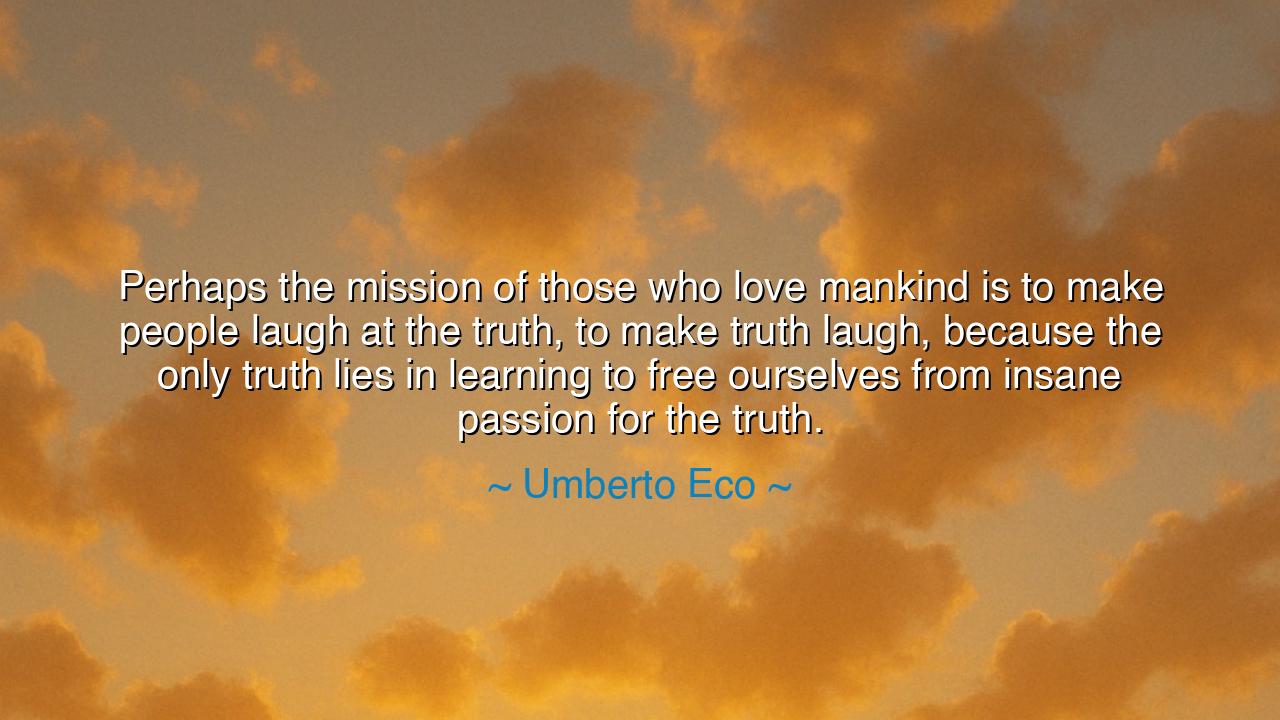
Perhaps the mission of those who love mankind is to make people
Perhaps the mission of those who love mankind is to make people laugh at the truth, to make truth laugh, because the only truth lies in learning to free ourselves from insane passion for the truth.






When Umberto Eco wrote, “Perhaps the mission of those who love mankind is to make people laugh at the truth, to make truth laugh, because the only truth lies in learning to free ourselves from insane passion for the truth,” he was speaking as both philosopher and sage, unveiling a paradox that has haunted humanity since the dawn of reason. His words shine with the humility of wisdom: that truth, though sacred, becomes dangerous when worshiped like an idol. For when man clings too tightly to his version of truth, he ceases to seek it—and begins instead to impose it. Eco’s insight calls us to a gentler path, where humor, humility, and wonder become the guardians of understanding.
In ancient times, the Greeks spoke of the oracle at Delphi who warned that the greatest sin was hubris—the pride of believing one holds absolute truth. Many have fallen to this folly. When truth hardens into dogma, it divides, blinds, and burns. Eco reminds us that those who truly love mankind must not wield truth as a weapon, but cradle it lightly, teaching others to laugh at its contradictions and their own. For laughter, unlike argument, disarms the ego. It restores balance to the mind. It turns fanaticism into reflection. Thus, to “make people laugh at the truth” is to liberate them from fanatical certainty, and to open the heart to the living mystery of existence.
Consider the story of Galileo Galilei, the man who gazed through a telescope and saw moons circling Jupiter, daring to challenge the old vision of the universe. He sought the truth, yet his discovery was met with persecution by those who claimed to already possess it. The Church of his age could not laugh at itself—it could not let truth laugh—so it turned enlightenment into heresy. Galileo’s quiet endurance teaches what Eco reveals: truth cannot thrive where pride rules. It must be approached with lightness, with irony, with joy. For even as Galileo proved the Earth moved, he whispered, “And yet it moves.” In that whisper, truth itself smiled.
To “make truth laugh,” as Eco says, is not to mock it, but to set it free from solemnity. When truth becomes humorless, it becomes cruel. It no longer liberates—it condemns. The great teachers of the world have always known this. Socrates used irony, Buddha used parables, Jesus used stories so simple and human that even a child could understand. They did not force truth upon men—they invited them to see it, to smile at it, to find it within themselves. That is why their teachings endure, for they loved mankind more than they loved being right.
Eco’s wisdom also speaks to our modern age, when every voice on the wind claims to hold the only truth. We live surrounded by information but starved of understanding. We argue endlessly, defend blindly, and forget to laugh. The “insane passion for the truth” that Eco warns of is this madness—the belief that certainty equals wisdom. In truth, wisdom begins when certainty ends. To love truth rightly is to question it, to dance with it, to know it changes as we do. The wise man smiles not because he knows less, but because he knows that all knowledge is provisional, like footprints on shifting sand.
Even Voltaire, who wielded wit as a sword, understood this eternal lesson. Through satire he exposed hypocrisy, and through laughter he defended freedom. He made men laugh at their follies so they might awaken to reason. In laughter lies compassion, and in compassion lies truth. The tyrant cannot bear laughter, for laughter reveals his fear. The fanatic cannot bear laughter, for laughter exposes his fragility. But the wise can laugh even at themselves, for they have learned that truth is not owned, but shared—a flame passed gently from hand to hand, not a torch to burn the unbeliever.
Let this, then, be the teaching passed down: love truth, but never worship it. Seek it, but never cage it. Laughter and humility are the twin guardians of the spirit, for they protect the mind from the poison of arrogance. Be like the traveler who kneels not to the sun, but to the light it gives. Make truth laugh, and it will reveal itself anew each day. Make men laugh at truth, and they will see that wisdom wears many faces. In the end, the highest truth may be this: that love and laughter, more than logic or law, are what truly free the soul of mankind.






AAdministratorAdministrator
Welcome, honored guests. Please leave a comment, we will respond soon